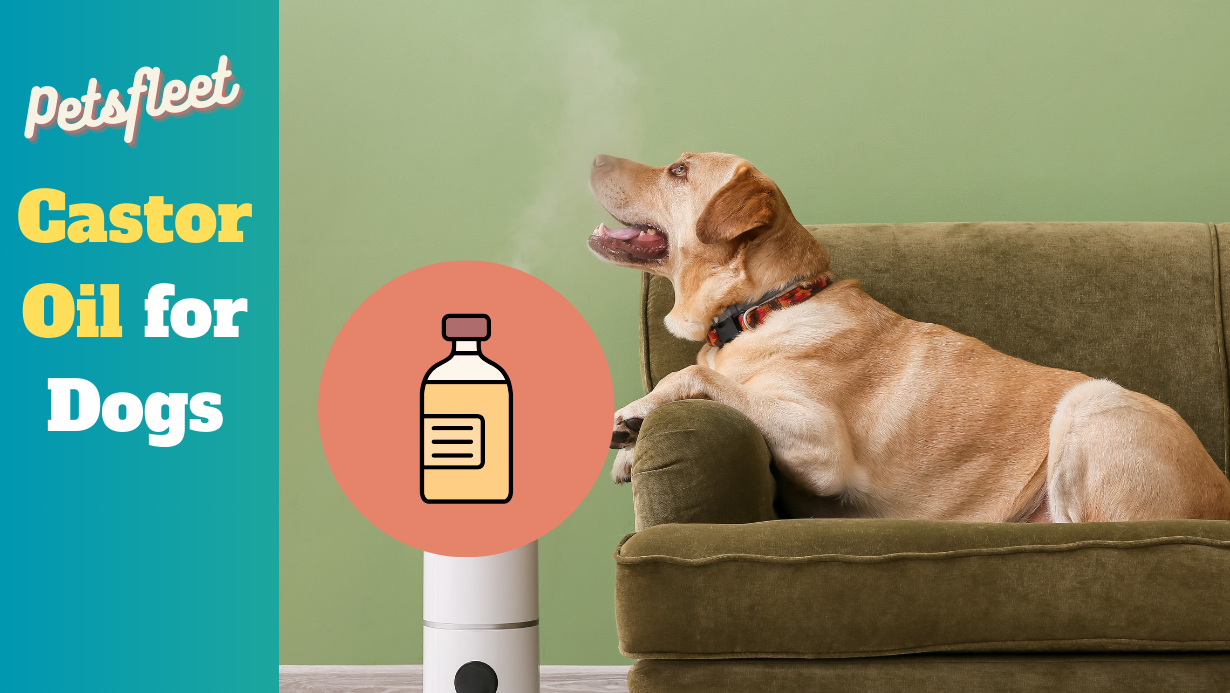Castor Oil for Dogs – Advantages, Cautions & Guidance

Castor oil for dogs has gained popularity among pet owners as a natural remedy for various ailments. From promoting healthy skin and coats to relieving constipation and joint pain, castor oil for dogs can be a valuable addition to their care routine. However, it is important to understand the advantages, cautions, and guidance when using castor oil on your furry friend. So, if you’re curious about the potential benefits of castor oil for your four-legged companion, keep reading!
What is Castor Oil?
Castor oil is produced from the seeds of the castor oil plant, scientifically known as Ricinus oil. It has been used for various medicinal and industrial purposes for centuries. Castor oil is known for its thick, yellowish consistency and distinct earthy scent. It is rich in ricinoleic acid, which is believed to have anti-inflammatory and analgesic properties. Castor oil is commonly used as a laxative, as it helps to stimulate bowel movements. It is also used in cosmetics, particularly in hair and skin care products, due to its moisturizing and nourishing properties. Additionally, castor oil is used in the production of soaps, lubricants, paints, and other industrial applications.
Benefits of Castor Oil for Dogs
Tumors, Cysts, and Growths
One of the key benefits of castor oil for dogs is its potential to treat tumors, cysts, and growths. Castor oil has been found to have anti-inflammatory and analgesic properties, which can provide relief and reduce inflammation in these health conditions. Applying castor oil topically to the affected area may help to shrink the tumors, cysts, or growths and alleviate any discomfort or pain experienced by the dog.
Prevent Hair Loss
Another benefit of castor oil is its ability to promote fur growth and prevent fur loss in dogs. The oil contains essential fatty acids, such as omega-6 and omega-9, which can nourish the hair follicles and promote healthy hair growth. Regularly massaging the dog’s coat with castor oil can help strengthen the hair shafts, reduce breakage, and prevent excessive shedding.
Prevents Dry Skin & Nose
Dry skin and nose are common issues that dogs may experience, especially during certain seasons or due to environmental factors. Castor oil can act as a natural moisturizer, providing hydration to the skin and nose. Applying a small amount of castor oil to the affected areas can help to soothe dryness, reduce flakiness, and restore moisture.
Reduce Cataracts
Cataracts, a common eye condition in older dogs, can also be potentially prevented or slowed down with the use of castor oil. The oil is rich in antioxidants and essential nutrients that may help to combat oxidative stress and reduce the formation of cataracts. Regularly applying a small amount of castor oil around the dog’s eyes can support eye health and maintain clear vision.
Relives Joint Pain
This oil is beneficial in providing relief from joint pain and inflammation. Applying castor oil topically to the affected joints can help to reduce inflammation, improve blood circulation, and alleviate pain.
Fights for Fleas and ticks
Castor oil for dogs has a unique property to repel and fight against the fleas and ticks present on dog fur and skin.
Antifungal & Antibiotic Nature
Castor oil has methyl ester and free fatty acid contents that combat the fungal and bacterial infections in pets.
Treat Constipation
Castor oil has a mild laxative effect, which can help to soften the stool and promote regular bowel movements. However, it is important to note that castor oil should only be used under veterinary guidance and in proper dosage to avoid any adverse effects.

Is Castor Oil Safe for Dogs?
Yes and no. Castor oil is generally considered safe for dogs when used in moderation and under the guidance of a veterinarian. It is important to note that, like any other substance, castor oil should be administered in appropriate dosage and with caution. Long-term use of castor oil in canines is not recommended. Some dogs may have adverse reactions to castor oil, such as diarrhea or vomiting, especially if they have underlying health conditions or are allergic to the oil. Castor oil should never be recommended for pregnant dogs.
Side Effects of Castor Oil in Dogs
- The oil can upset the dog’s digestive system and lead to loose and frequent bowel movements or diarrhea.
- Castor oil for dogs causes gastrointestinal upset, which can manifest as vomiting and stomach discomfort.
- In some cases, dogs may develop an allergic reaction to castor oil, leading to symptoms such as itching, rash, and difficulty breathing.
- Overusing or improperly administering castor oil to dogs can result in weakness.
- Continuous use of castor oil for dogs causes mineral depletion from your furry friend’s body.
How to Use Castor Oil in Dogs
For constipation, it’s recommended to give 1 or 2 drops per dog orally to loosen your pet’s stool. The castor oil dose may vary depending on the size of your canine friend. You can also use castor oil topically twice a day to relieve itching and irritation. Before application, dilute the castor oil with a carrier oil such as coconut oil or olive oil to ensure safe and effective use. Furthermore, it is essential to follow specific dosage guidelines provided by a vet and monitor the dog for any adverse reactions.
What to do if a dog ingests castor oil?
Castor oil is a highly effective stimulant laxative, which may result in diarrhea. Nausea or vomiting can occur, although this is rare. If vomiting does occur, it is recommended to administer an anti-nausea medication like Pepcid AC.
In cases of castor oil poisoning, it is best to seek treatment from a qualified veterinarian. The sooner treatment is administered, the lower the amount of toxin absorption and damage potential. It is crucial to bring your canine friend to a vet as quickly as possible for proper care.
Conclusion
In conclusion, castor oil can be a beneficial supplement for dogs when used appropriately and in consultation with a veterinarian. It can promote gastrointestinal health, add shine to the coat, and soothe dry or irritated skin. However, it is important to note that castor oil should only be used externally or in small, controlled doses when administered orally. It is always best to consult with a professional before introducing any new supplements or treatments for your furry companion.
FAQs
How much castor oil is used for dog constipation?
The recommended dosage is 5-25ml per oral for constipation, depending upon the size of the dog.
Does castor oil shrink tumors in dogs?
Yes, castor oil shrinks tumors in dogs due to its anti-inflammatory nature.
Can I put castor oil on my dog’s nose?
You can externally apply the castor oil on your dog’s snout to moisturize it. But try to avoid putting inside your dog’s nose deeply.
Is castor oil good for my dog’s skin?
Yes, castor oil is very good for dog skin allergies, ticks, fleas, and fungal infections.






